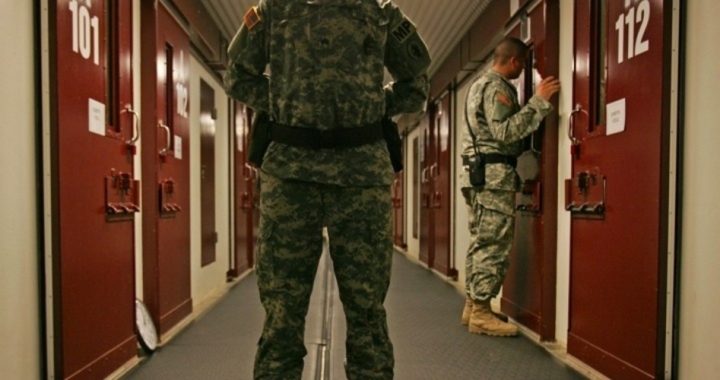
Lawyers for a group of journalists challenging the indefinite detention provisions of the Fiscal Year 2012 National Defense Authorization Act (NDAA) filed an “Emergency Application” with the U.S. Supreme Court on Wednesday. The motion asks the high court to set aside an appeals court’s stay of the favorable injunction against the NDAA obtained by the journalists/activists turned plaintiffs on September 12.
Specifically, the motion submitted to Justice Ginsburg by attorneys Bruce Afran and Carl Mayer on behalf of Chris Hedges and his co-plaintiffs requests that “the Supreme Court vacate a stay pending appeal entered on October 2, 2012 by the Court of Appeals for the Second Circuit.”
Afran and Mayer argue that contrary to the judge’s opinion accompanying the stay of the earlier injunction, the lower court’s block of the enforcement of the NDAA’s indefinite detention provisions does not “interfere with the president’s management of ‘active hostilities.’”
Furthermore, should the stay of the injunction be made permanent and the president be allowed to exercise these extraordinary, historical, and unconstitutional powers, the plaintiffs and many Americans will be placed “in actual and imminent danger of losing their core First Amendment rights and fundamental Equal Protection liberties.”
On October 2, a panel of three judges heard the motion to block the injunction against exercise of the indefinite detention provisions filed by the Obama administration and in their ruling they point to “flaws within the scope and rationale” of the permanent injunction issued earlier by District Court Judge Katherine Forrest.
“We conclude that the public interest weighs in favor of granting the government’s motion for a stay,” write Judges Denny Chin, Raymond Lohier, and Christopher Droney in their order fast-tracking the appeal of the earlier injunction.
The appellate court order reads:
First, in its memorandum of law in support of its motion, the government clarifies unequivocally that, “based on their stated activities,” plaintiffs, “journalists and activists[,] … are in no danger whatsoever of ever being captured and detained by the U.S. military.”
Second, on its face, the statute does not affect the existing rights of U.S. citizens or other individuals arrested in the United States. See NDAA § 1021(e) (“Nothing in this section shall be construed to affect existing law or authorities relating to the detention of United States citizens, lawful resident aliens of the United States, or any other persons who are captured or arrested in the United States.”).
Third, the language of the district court’s injunction appears to go beyond NDAA § 1021 itself and to limit the government’s authority under the Authorization for Use of Military Force.
On September 17, on the 225th anniversary of the signing of the final draft of the Constitution, with a one-page order Judge Lohier on his own effectively repealed many of that document’s fundamental protections of individual liberties.
Issued in the middle of the night, the order written by Judge Lohier temporarily set aside a lower court’s injunction blocking indefinite detention provisions of the National Defense Authorization Act (NDAA). The practical effect of Judge Lohier’s stay was the immediate reinstatement of the president’s authority to send the military to apprehend and indefinitely imprison a person suspected of colluding with a terrorist organization to threaten U.S. national security.
In the order, Judge Lohier offered no explanation for his decision, preferring to postpone publishing any opinion until the matter is thoroughly reviewed by the Second Circuit.
That order is now superseded by the order handed down today by Lohier and his colleagues.
Judge Forrest issued the now-stayed permanent injunction on September 12 and attorneys for the Obama administration filed an immediate appeal.
In the opinion supporting the permanent injunction of the indefinite detention powers granted by the NDAA, Judge Forrest wrote:
The due process rights guaranteed by the Fifth Amendment require that an individual understand what conduct might subject him or her to criminal or civil penalties. Here, the stakes get no higher: indefinite military detention — potential detention during a war on terrorism that is not expected to end in the foreseeable future, if ever. The Constitution requires specificity — and that specificity is absent from § 1021(b)(2).
This is similar to the language she used in the 68-page opinion accompanying the temporary injunction order. In that order Judge Forrest disagreed with the federal government’s argument that the relevant provisions of the NDAA merely restate existing law.
She wrote: “Section 1021 is not merely an ‘affirmation’ of the AUMF [Authorization for the Use of Military Force].” Pointing out that were Section 1021 and the AUMF identical then the former would be redundant, Judge Forrest held:
Section 1021 lacks what are standard definitional aspects of similar legislation that define scope with specificity. It also lacks the critical component of requiring that one found to be in violation of its provisions must have acted with some amount of scienter — i.e., that an alleged violator’s conduct must have been, in some fashion, “knowing.”
Section 1021 tries to do too much with too little — it lacks the minimal requirements of definition and scienter that could easily have been added, or could be added, to allow it to pass Constitutional muster.
While admitting that preventing the federal government from enforcing a congressional act is a sober matter that must be attended to with caution, Judge Forrest wrote that “it is the responsibility of our judicial system to protect the public from acts of Congress which infringe upon constitutional rights.”
The principal allegation made by the plaintiffs against the NDAA was that the vagueness of critical terms in the NDAA could be interpreted by the federal government in a way that authorizes them to label journalists and political activists who interview or support outspoken critics of the Obama administration’s policies as “covered persons,” meaning that they have given “substantial support” to terrorists or other “associated groups.”
According to the text of Section 1021 of the NDAA, the president may authorize the armed forces to indefinitely detain:
A person who was a part of or substantially supported al-Qaeda, the Taliban, or associated forces that are engaged in hostilities against the United States or its coalition partners, including any person who has committed a belligerent act or has directly supported such hostilities in aid of such enemy forces.
Fearing that this section could be applied to journalists and that the specter of such a scenario would have a chilling effect on free speech and freedom of the press in violation of the First Amendment, Hedges filed his lawsuit on January 12, 2012. (Naomi Wolf writes in her affidavit that she has refused to conduct many investigative interviews for fear that she could be detained under the auspices of applicable sections of the NDAA.)
Hedges’ complaint claims that his extensive work overseas, particularly in the Middle East covering terrorist (or suspected terrorist) organizations, could cause him to be categorized as a “covered person” who, by way of such writings, interviews and/or communications, “substantially supported” or “directly supported” “al-Qaeda, the Taliban or associated forces that are engaged in hostilities against the United States or its coalition partners,… under §1031(b)(2) and the AUMF [Authorization for Use of Military Force].”
Specifically, Hedges alleges in his complaint that it is precisely the existence of these “nebulous terms” — terms that are critical to the interpretation and execution of the immense authority granted to the president by the NDAA — that could allow him or someone in a substantially similar situation to be classified as an enemy combatant and sent away indefinitely to a military detainment center without access to an attorney or habeas corpus relief.
In a statement to the Huffington Post, attorney Carl Mayer said, “As long as the NDAA is law in this country, journalists and activists like our clients, really any American citizens or civilians, are not safe from having the military detain them indefinitely.”
“We don’t know” if Americans have been targets of indefinite detention under the NDAA, Mayer said. “That’s the whole problem,” he added. “It’s secret government and it’s secret detention.”
The House of Representatives and Senate are currently working on a compromise version of the NDAA for Fiscal Year 2013. The indefinite detention provisions remain, although an amendment to the bill passed by the Senate on November 29 purports to guarantee the right to trial by jury to U.S. citizens and permanent residents detained under the updated version of the act.
Photo: AP Images
Joe A. Wolverton, II, J.D. is a correspondent for The New American and travels frequently nationwide speaking on topics of nullification, the NDAA, and the surveillance state. He can be reached at [email protected].



